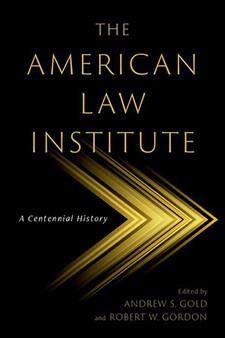Tracing 100 Years of the American Law Institute

Yale Law School’s Robert W. Gordon and Brooklyn Law School’s Andrew Gold have co-edited a new volume that considers pivotal moments in the history of the American Law Institute (ALI), which marks its 100th anniversary this year. The American Law Institute: A Centennial History (Oxford University Press, 2023) traces how the ALI, one of the most important legal institutions in the United States, continues to pursue its original mission of reducing complexity and promoting uniformity in American law.

ALI held its first Annual Meeting in February 1923, and early leaders included William Howard Taft, Charles Evans Hughes, Learned Hand, and Benjamin Cardozo. Gordon and Gold describe the ALI as an enduring movement for legal reform, exemplary not only for its influence, but also its longevity.
“Most such projects terminate when they achieve their limited initial goals, they fail, or their members lose interest and their funding runs out,” the co-editors write. “The ALI remains an enterprise in full vigor, with an enormous number of projects completed and an impressive array of projects in forward motion.”
Since its founding, the ALI has been dedicated to making American law clearer and more modern. The Institute publishes three kinds of projects, which are known as Restatements, Principles, and Codes. Each serves as an authoritative reference for courts, legislatures, and other audiences. The ALI brings projects for a vote before its elected members, who comprise leading lawyers, judges, and legal scholars. The Institute is widely known for its culture of robust exchange and democratic discourse.

Gordon and Gold’s volume spans 20 chapters, which consider the ALI’s work from a range of practical and conceptual angles. Rather than give a comprehensive history, contributors examine crucial debates and decisions that have shaped the organization. Many bring personal insight, having themselves written ALI projects. “The authors, as readers will see, approach the ALI and its works from a variety of perspectives,” Gordon and Gold write. “The resulting book is a window into the course of legal thought over a century.”
In addition to Gordon, the volume’s contributors include Anne Urowsky Professor of Law Douglas NeJaime and Florence Rogatz Visiting Professor of Law Richard Brooks.
The volume also features work by Yale Law School alumni Kenneth Abraham ’71, the David and Mary Harrison Distinguished Professor of Law at the University of Virginia School of Law; George A. Bermann ’71, the Walter Gellhorn Professor of Law and Jean Monnet Professor of European Union Law at Columbia Law School; Richard L. Revesz ’83, Dean Emeritus of New York University School of Law and former Director of the ALI; Henry Smith ’96, the Fessenden Professor of Law at Harvard Law School; and Allison Tait ’11, Associate Dean for Faculty Development and Professor of Law at the University of Richmond School of Law.
Robert W. Gordon is the Chancellor Kent Professor Emeritus of Law and Legal History at Yale Law School and Professor of Law Emeritus at Stanford Law School. He is the author of Taming the Past: Essays on Law in History and History in Law (Cambridge University Press, 2017). He has edited or co-edited the volumes Law, Society, and History: Essays on Themes in the Work of Lawrence M. Friedman (Cambridge University Press, 2011) and The Legacy of Oliver Wendell Holmes, Jr. (Stanford University Press, 1992).
Andrew Gold is Professor of Law at Brooklyn Law School, where he serves as Associate Director of the Center for the Study of Business Law and Regulation and Director of the Program on Private Law. He most recently authored The Right of Redress (Oxford University Press, 2020). Gordon is a life member, and Gold an elected member, of the ALI.


